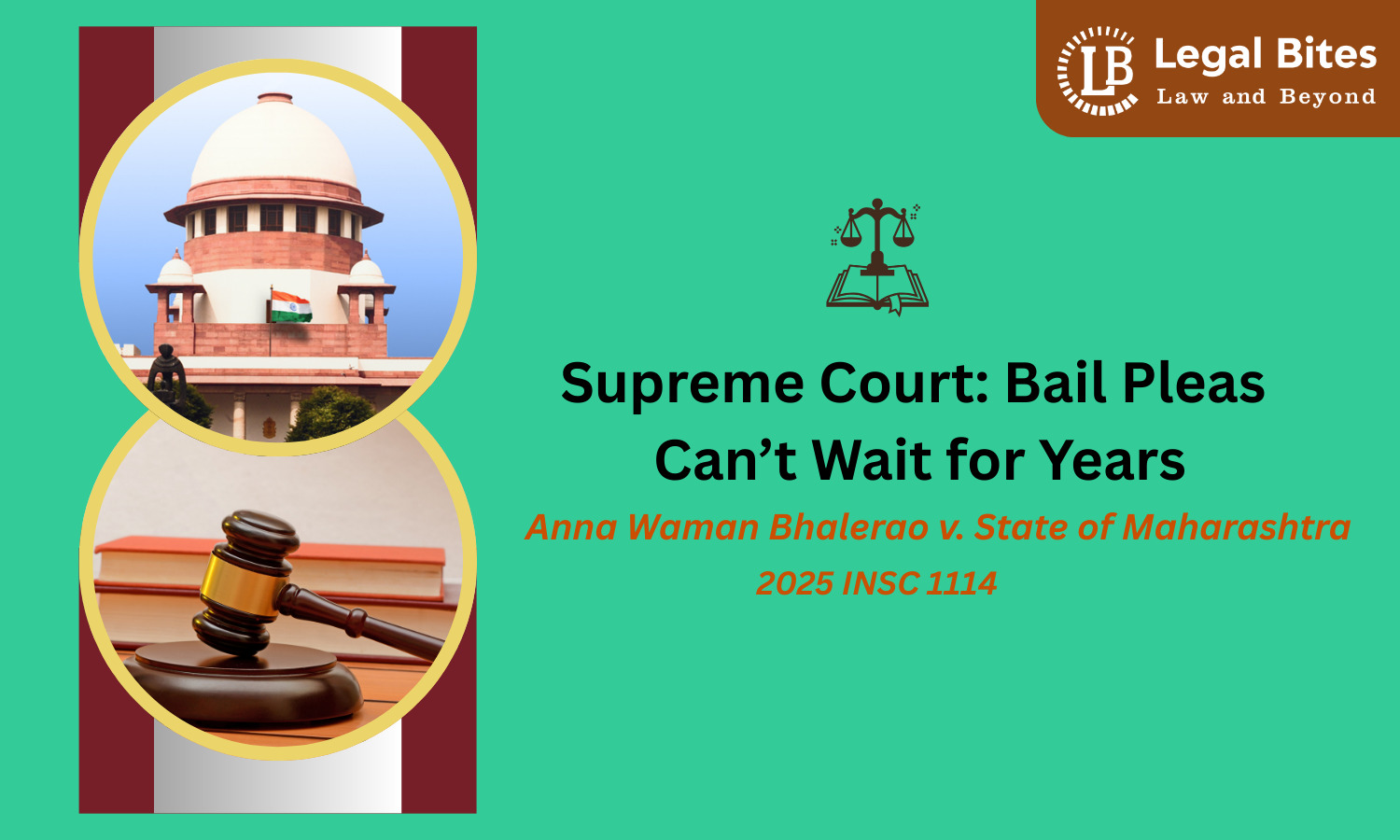
The Supreme Court of India, in Anna Waman Bhalerao v. State of Maharashtra (2025 INSC 1114), has issued a strong reminder to High Courts and subordinate courts on the urgent need to dispose of bail and anticipatory bail applications within a reasonable time. The Court emphasised that delays in such matters strike at the very heart of personal liberty guaranteed under Article 21 of the Constitution.
While dismissing the appellants’ plea for anticipatory bail, the Court turned its attention to the systemic problem of indefinite pendency of bail matters and underscored that courts must not allow a “sword of Damocles” to hang over the heads of litigants by deferring decisions indefinitely.
Background of the Case
The case arose out of allegations of fraudulent property transactions in Maharashtra dating back to 1996. The appellants, former government officials (Circle Officer and Talathi), were accused of certifying mutation entries based on forged documents. Although the disputed entries were annulled in 1998, the FIR was lodged two decades later in 2019.
The appellants had sought anticipatory bail in 2019, which was rejected by the Sessions Court but temporarily protected by the Bombay High Court. However, their applications remained pending before the High Court for over six years before finally being dismissed in July 2025. During this period, the appellants enjoyed interim protection from arrest.
Supreme Court’s Observations
1. Delay in Disposal of Bail Applications
The Supreme Court expressed displeasure at the inordinate delay in deciding anticipatory bail pleas. Even though the appellants enjoyed interim protection, the Court stressed that prolonged uncertainty is itself a violation of liberty:
- Applications involving personal liberty should not be kept pending for years.
- Bail and anticipatory bail matters must be treated as priority cases.
- Courts must avoid adjournments without specific dates for final disposal.
2. Constitutional Ethos and Liberty
Referring to Magna Carta, the Habeas Corpus Act of 1679, the Petition of Right (1628), and the U.S. Constitution, the Court reiterated that bail is a vital safeguard of liberty. It emphasised that excessive or indefinite delay in bail adjudication effectively denies justice, contravening Articles 14 and 21.
3. Reference to Previous Rulings
The Court cited multiple cases where similar concerns were raised:
- Rajesh Seth v. State of Chhattisgarh – indefinite adjournments in bail matters are impermissible.
- Sanjay v. State (NCT of Delhi) – bail pleas cannot be posted months later without interim relief.
- Rajanti Devi v. Union of India – one-year pendency of an anticipatory bail petition was strongly deprecated.
- Satendra Kumar Antil v. CBI – bail applications should be decided within two weeks; anticipatory bail within six weeks.
These precedents highlight a consistent judicial approach: personal liberty requires prompt judicial action.
Directions Issued by the Supreme Court
To address the systemic delay, the Court issued binding directions:
- Timeframe for Disposal – Bail and anticipatory bail applications must be decided expeditiously, preferably within two months from filing, except where delay is caused by the parties.
- Administrative Measures – High Courts must issue directions to subordinate courts to prioritise liberty-related matters.
- Avoid Indefinite Pendency – Bail applications must not be adjourned without definitive dates; judgments should not be reserved indefinitely.
- Investigating Agencies – Must conclude investigations promptly to prevent prejudice to both complainants and accused.
- Registrar (Judicial) Compliance – The Supreme Court ordered the circulation of its judgment to all High Courts for immediate compliance
Significance of the Judgment
This ruling is significant for several reasons:
- Strengthening Article 21 – It reinforces that a delay in bail proceedings amounts to a denial of the right to life and personal liberty.
- Judicial Accountability – High Courts are reminded of their constitutional duty to prevent liberty-related cases from languishing.
- Systemic Reform – By fixing a two-month benchmark, the Court provides clarity and uniformity in handling bail matters across jurisdictions.
- Balance of Liberty and Investigation – While dismissing the appellants’ plea, the Court balanced individual liberty with the seriousness of allegations, but stressed systemic responsibility to prevent pendency.
Conclusion
The Supreme Court’s ruling in Anna Waman Bhalerao sends a clear message: bail applications cannot be kept pending indefinitely. By reiterating that personal liberty lies at the core of constitutional democracy, the Court has laid down enforceable timelines for bail adjudication.
This judgment not only provides relief to litigants caught in long delays but also signals to High Courts and trial courts that matters involving liberty must take precedence over docket congestion. In doing so, the Supreme Court has reaffirmed that justice delayed in bail matters is truly justice denied.
Important Link
Law Library: Notes and Study Material for LLB, LLM, Judiciary, and Entrance Exams